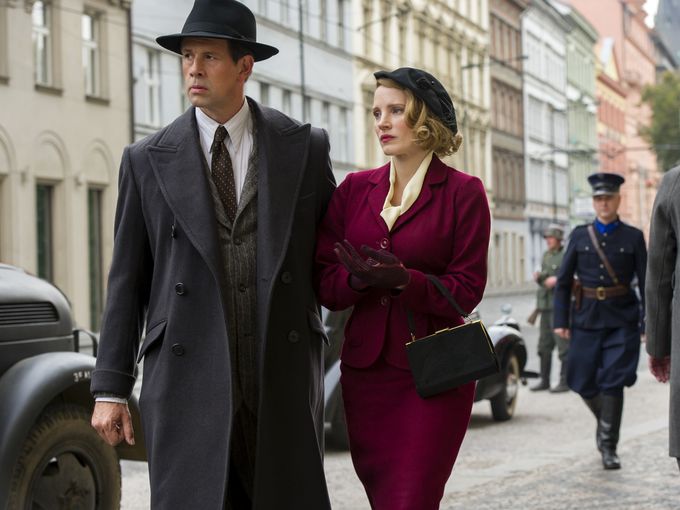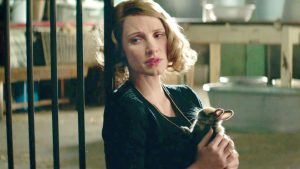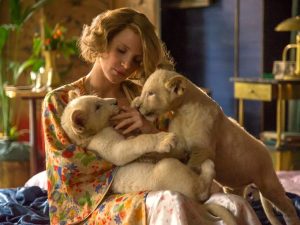Directed by Niki Caro | Written by Angela Workman adapting the book by Diane Ackerman | 124 min
The true story of Antonina and Jan Żabiński, a Polish couple who ran the Warsaw Zoo during World War II. When the Nazis marched into Poland the soldiers ransacked the zoo, exporting some of the animals to Berlin while killing others. The couple negotiated with them, turning the zoo into a temporary pig farm to feed the occupiers. The couple secured supplies from Warsaw Ghetto scraps and garbage while secretly spiriting Jews out of that notorious place and hiding them in their sprawling compound, saving lives any way they could.
It’s a good story, full of emotion. Cast Jessica Chastain in anything and you’re halfway there. Her Antonina is a deeply principled woman, astonishingly good and brave, and she has a way of anchoring everything that goes on around her. Johan Heldenbergh, as Jan, brings the required Baltic stoicism. And Daniel Brühl plays one of his soon-to-be-patented cocky dudes (a la Inglorious Basterds), a German zookeeper-turned-SS officer compromised by his feelings for Antonina.
The film is handsome-looking, lush and colourful in places with great sets, locations, and costumes. There are moments that will fracture at the hardest heart; trusting children raising their arms to be lifted onto the trains going to concentration camps, ash floating through the afternoon sunlight as the Ghetto burns. But otherwise Caro frames her interiors and actors the same way from scene to scene, making for a dull and stolid storytelling aesthetic that works against the tale’s inherent dramatic punch.
The film also aches with a lack of authenticity that keeps it from being very good, let alone great. It reminded me of The Book Thief, another tonally askew picture in a similar wartime setting. This isn’t quite the ill-advised fairy tale the previous picture tried to be, but it’s so damn fuzzy and tasteful—we get more than one scene of children hugging skunks and napping with lion cubs, and Chastain snuggling with a bunny (see above) like it’s a Polish-set Born Free. It doesn’t help that the dialogue is frequently clunky and cliched, spoken in a painfully accented English—varying from actor to actor—and difficult to take seriously. This is very earnest stuff, but all in a kind of soft focus that never quite manages to convince as the period. If the death of zoo animals passes for a kind of symbolism, it still feels slight.









